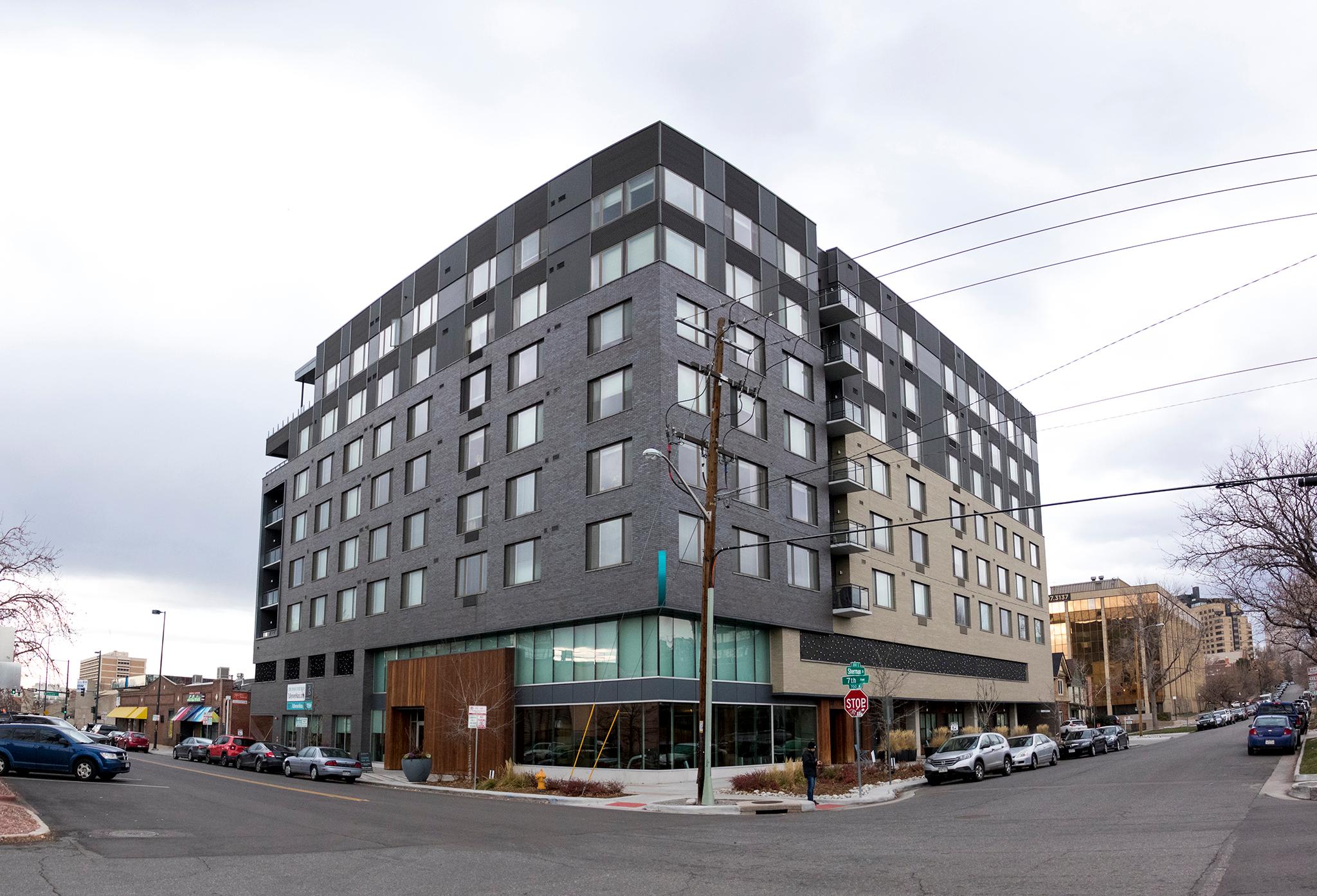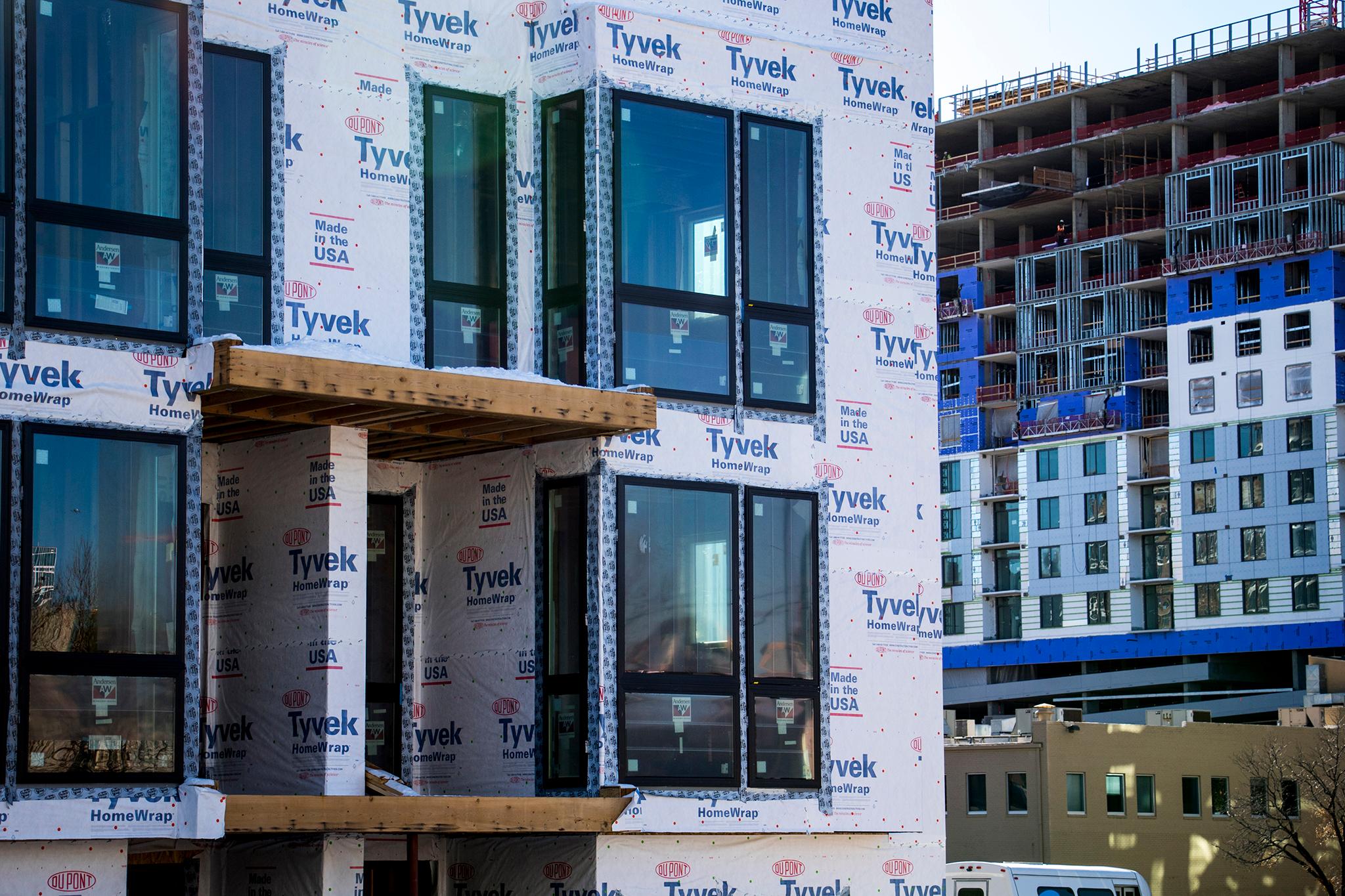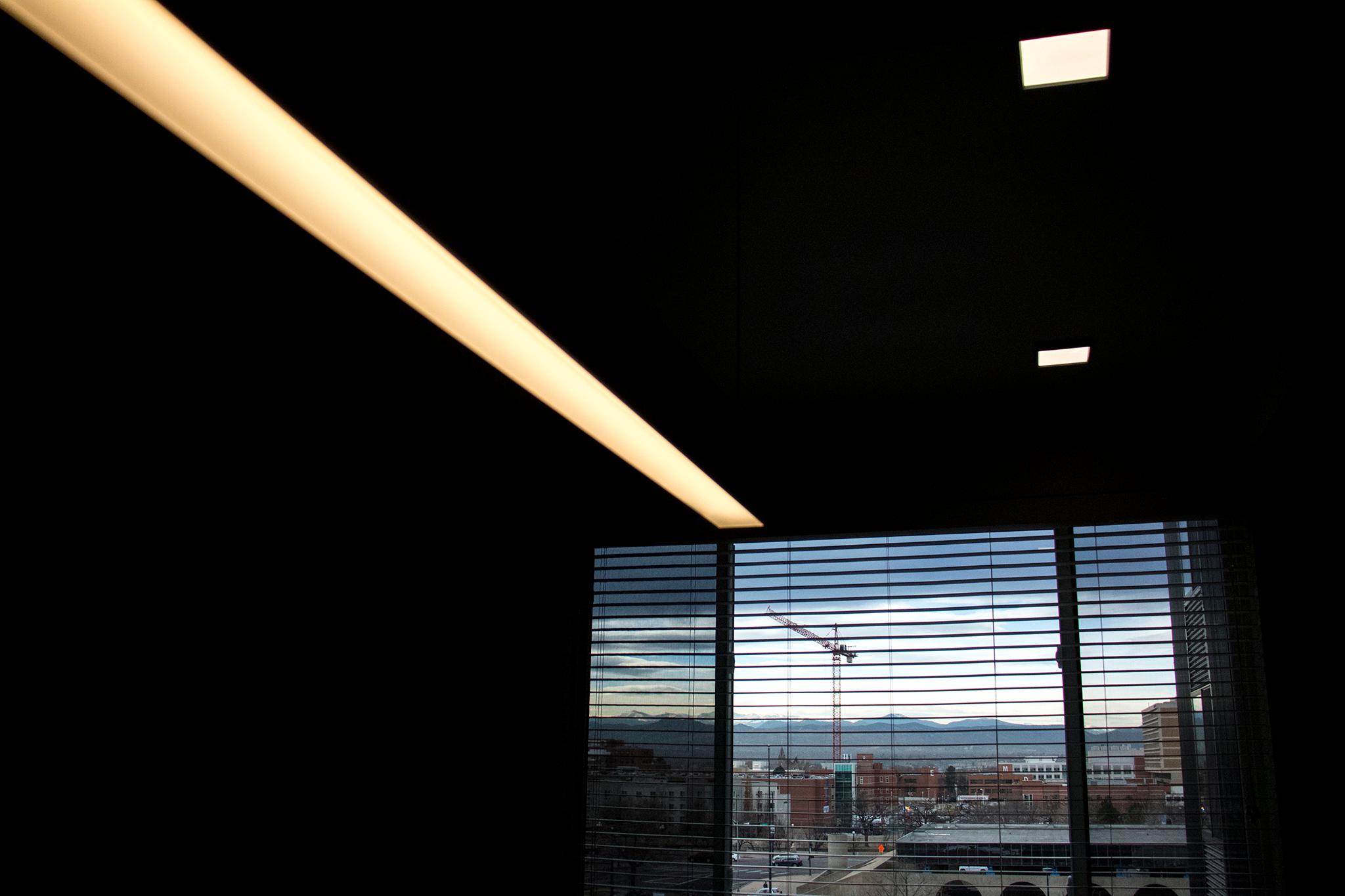The manager of 7/S Denver Haus says her eight-story, two-year-old apartment building at Seventh and Sherman has one of the best rooftops in the city.
Tenants can take in mountain sunsets, grill a steak on the patio, or warm up next up to the fireplace in the lounge on days less conducive to barbecue. And manager Bethany Anderson can check out the coming competition.
"Sometimes I try to count the cranes," Anderson said.
It's an activity that can keep you busy in this neighborhood. By a rough count that the city's department of Community Planning and Development put together, a dozen towers started since 2015 on or near Speer Boulevard have added or soon will add more than 2,400 apartment units to the Golden Triangle and environs. Urbanist and CU Denver planning professor Ken Schroeppel goes back a few more years and documents several other new buildings on his blog DenverInfill. Schroeppel also counted some hotels, so not all the towers are about long-term housing. Though some of the tenants get five-star hotel treatment.
Tony Carnesi, CEO of Keller Williams Denver Tech Center, said the area has "kind of gone vertical." In the 1950s and '60s and even into the '70s and '80s it was dominated by modest family homes, Carnesi said.
Carnesi added the new apartments are drawing young professionals who want a city lifestyle but perhaps can't afford - or are saving to buy and don't want to pay - downtown or Cherry Creek rents. LoDo-like advantages include not having to worry about shoveling or taking care of a yard, without a LoDo scene some find too crowded and noisy. And when they do want the LoDo scene, they can get there on the bike path.

Not that the apartments along Speer Boulevard are cheap - a 619-square-foot one-bedroom at 7/S Denver Haus is going for $1,670 a month. The Apartment Association of Metro Denver found the Denver area's average rent in the third quarter was $1,465.
Anderson, who manages 7/S, can look down the street to a construction site that promises to offer "a new perspective on luxury living." The rendering shows a pool, which 7/S lacks. Anderson knows prospective tenants will be making comparisons and asking for deals. But she has few vacancies at the moment and hers is not among the buildings decorated with banners offering move-in specials or the first month free.
Those banners, Carnesi said, raise questions about the long-term viability of the luxury business plan. But for now, demand is high enough.
Where does that leave the rest of us?
Developers who find the construction costs are much the same no matter what they build can secure profitability by chasing high-paying tenants or by chasing tax credits and subsidies for affordable units. Either way, they're not likely to build without a good chance of making money, and the city needs them to build.
The new towers, at least, ease competition for older buildings not far away, making units there a bit more affordable. A few of those, such as the grand Colburn Hotel, offer rentals at below-market prices, allowing at least some low-income Denverites to enjoy elements of what the neighborhood has to offer.
Robert W. Speer might be pleased by the embrace of the city that is evident in the new buildings along his namesake boulevard.
Speer, who was Denver's mayor from 1904 and 1918, was a proponent of the national "City Beautiful" movement. His vision is credited with Civic Center, tree-lined parkways and other streetscapes and architectural elements that make parts of Denver so attractive from a pedestrian's vantage point.
The new towers' tenants can walk to Trader Joe's at 6th and Logan or the King Soopers at 13th and Speer. The Cherry Creek Trail puts LoDo a quick cycle away for those who want a change of scene from myriad nearer-by bars and restaurants. For the culturally minded, the neighborhood is home to the Denver Art Museum, Kirkland Museum of Fine & Decorative Art, History Colorado Center and Clyfford Still Museum, and to parks that include Civic Center and Sunken Gardens, the latter tucked behind Denver Health's main hospital.
Denver Health and Anthem insurance are among this truly mixed-use area's major employers. Galleries, architecture's studios and media companies create creative jobs. Government offices have spread from City and County and the state Capitol. Think tanks and other nonprofits that want to influence public occupy space in newer buildings or in some of those single-family Victorians homes now converted to commercial. Courts and the jail bring lawyers and bail bondsmen to other offices.
BCycles in their stands and their free-range bike and scooter cousins are everywhere. Major bus lines connect to light and commuter rail. The route of the app-based, bus-on-whatever-the-opposite-of-steroids-is Chariot transit system launched last month runs through the area.
Eviva on Cherokee, a 274-unit apartment building at 13th that was completed last spring, offers tenants bus schedules, ETAs for shared cars and other transit information on a touchscreen in the lobby. For those who don't want to take a bus or an Uber, "it's a seven-minute walk to downtown," said Clyt'ta Berg, an Eviva leasing agent.
Yet still they park.
Eviva has five levels of parking. All along Speer, blocks of parking are as common an architectural element as variegated facades. Denver RE/MAX agent Kerron Stokes, though, said they don't contain typical spaces.
"There's nuance from builder to builder," he said.
Some provide just enough space for one car and a bicycle.
"They are built for smaller vehicles," he said. "You try to put an SUV in there, they're not going to fit."
The spaces are an amenity, like a well-appointed rooftop. A choice for those able to pay, not a necessity.
More money, more amenities.
At Evita, which bills itself as a "sanctuary in the city," a 917-square-foot one-bedroom will cost you about $2,500 a month.
The concrete-and-glass building has views of the Rockies to the west and the Denver Art Museum and the Central Library to the east. Among the amenities included in the rent are regular events such as yoga classes and barbecues. The gym is well-equipped. The pool, heated and saline, shares a deck above the parking block with fire pits, a bocce court and corn hole boards.
A concierge is on duty 24/7 to help with dinner reservations or tickets to a game or maybe wrestle a package up to your home. For an extra fee, the concierge will walk your dog while you're traveling.
"Hey Reggie, how ya doing?" Berg said, greeting the dog first as she passed a tenant and her pet in the coffee lounge off the lobby.
"If you don't have a beard or a pet, you're not a Denverite," Berg said.
At Eviva, in addition to staff who know the animals by name, "pet friendly" means a room equipped with hoses and other equipment where tenants can bathe their dogs. The building also has a bike shop with pumps and a vending machine stocked with locks, tubes and light batteries.
If it all seems a bit much, it could be more. Berg notes that Eviva does not have a chef-in-residence, one of the perks at Country Club Towers II and III. That 552-unity twin development completed last year in Washington Park may be what some Speer-area residents secretly aspire to.

What could be more luxurious than your own elevator?
In a less heated housing market, some of the tenants of the new towers might be buying homes. In its latest report, the Denver Metro Association of Realtors said the average price of a home sold in the area was $462,344, up 6.47 percent over last year. Areas with the most new apartments available are seeing declining rents, the association said, adding apartment supply might be dampening home sales. The association also said, though, that the Denver area is a buyer's market for luxury homes because of relatively high inventory.
Liv Sotheby's agent Deviree Vallejo has been helping buyers snap up new townhouses in the area. Among her buyers are people who were recent renters in some of the properties along Speer.
Vallejo's listings include three duplexes, each 2,400-square-feet with three bedrooms, about to be completed that feature shafts where buyers have the option of installing elevators. The roof decks offer glimpses of the Rockies, the art museum and many, many cranes. For just over $1 million, the buyers won't have to share the views.
"They're expensive. But, that being said, there've also been $2 million townhouse sales in the Golden Triangle," Vallejo said. "The people who want to live down here are passionate about the Golden Triangle."












